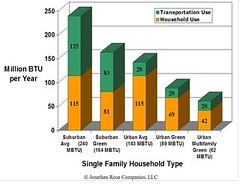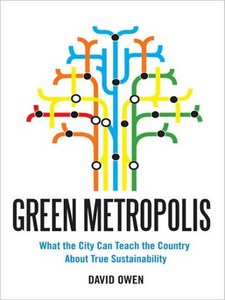Green Metropolis
In 2004, David Owen wrote a story in the New Yorker, "Green Manhattan," about how cities can be "more correct"environmentally than people realize. This is particularly true with regard to energy use, both for transportation and in the home.

He has expanded this idea into a book called Green Metropolis, which has been reviewed in the Christian Science Monitor and the New York Times Book Review ("Urban Is Good").

From the NYT review:
Owen, a staff writer for The New Yorker, makes a convincing case that Manhattan, Hong Kong and large, old European cities are inherently greener than less densely populated places because a higher percentage of their inhabitants walk, bike and use mass transit than drive; they share infrastructure and civic services more efficiently; they live in smaller spaces and use less energy to heat their homes (because those homes tend to share walls); and they’re less likely to accumulate a lot of large, energy-sucking appliances. People in cities use about half as much electricity as people who don’t, Owen reports, and the average New Yorker generates fewer greenhouse gases annually than “residents of any other American city, and less than 30 percent of the national average.”
And the carbon footprint of the hybrid-driving country dweller with her triple-paned windows, backyard composter and geothermal heat pump? Fuhgeddaboudit, Owen practically shouts: she’s still driving to work, to school, to shops and the post office. He doesn’t care if she’s powered by French fry grease or the juice of photovoltaic panels: “Wasted energy is wasted energy no matter how it’s generated.”
Speaking of the illusion of technology as the ultimate fix, see this editorial from the Financial Times, "Electric Daydreams," on electric cars.
Labels: energy, environment and behavior, sustainable land use and resource planning, urban design/placemaking



0 Comments:
Post a Comment
<< Home